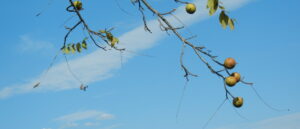A fixed duration of time is a bounded region on a path along which an observer moves. In short, a duration of time is, in this metaphor, conceptualized as a container.
George Lakoff & Mark Johnson, Philosophy in the Flesh
The canopy of leaves appeared solid throughout the hot summer, its entire nature dense and uniform, its shade thick and deep. Within a few days, that canopy will shatter. If I accept the philosophers’ time as a container, autumn is a jug into which and during which all the leaves come down and all the last flowers fall. In such a scenario, October is not so much a part of an astronomical sequence as it is a bounded region in which we live.
Everything from the whole year past goes into the jug of October. Events and objects get mixed up in the tumble. The smooth wall of June is torn apart. The best sense of what we are in this place dissolves. All of the long green horizon crumbles.
Any meaning that an observer might have associated with the middle of the year is recast. The change of appearance is the change of essence. The undoing of the trees and flowers tips the full glass of summer to empty, pours out old and familiar landmarks and gauges and pointers all at once.
Untied from the orderly queue of Earth’s relationship to the Sun, the contents of October’s jug have no geography recognizable from August. Nothing looks the way it used to look. The inner space contains pathways but no direction or destination. Nothing linear matters because there is no place to go until the container is filled again, this time with leaves and frost and snow.


You’ve been in Portland in the autumn before and so know that rain would have also been in the jug. Much green horizon still remains here as we visit and along the way to the coast, where we went yesterday. Congratulations on another meld, pulling together outer and inner into one unity, as your reveries do.